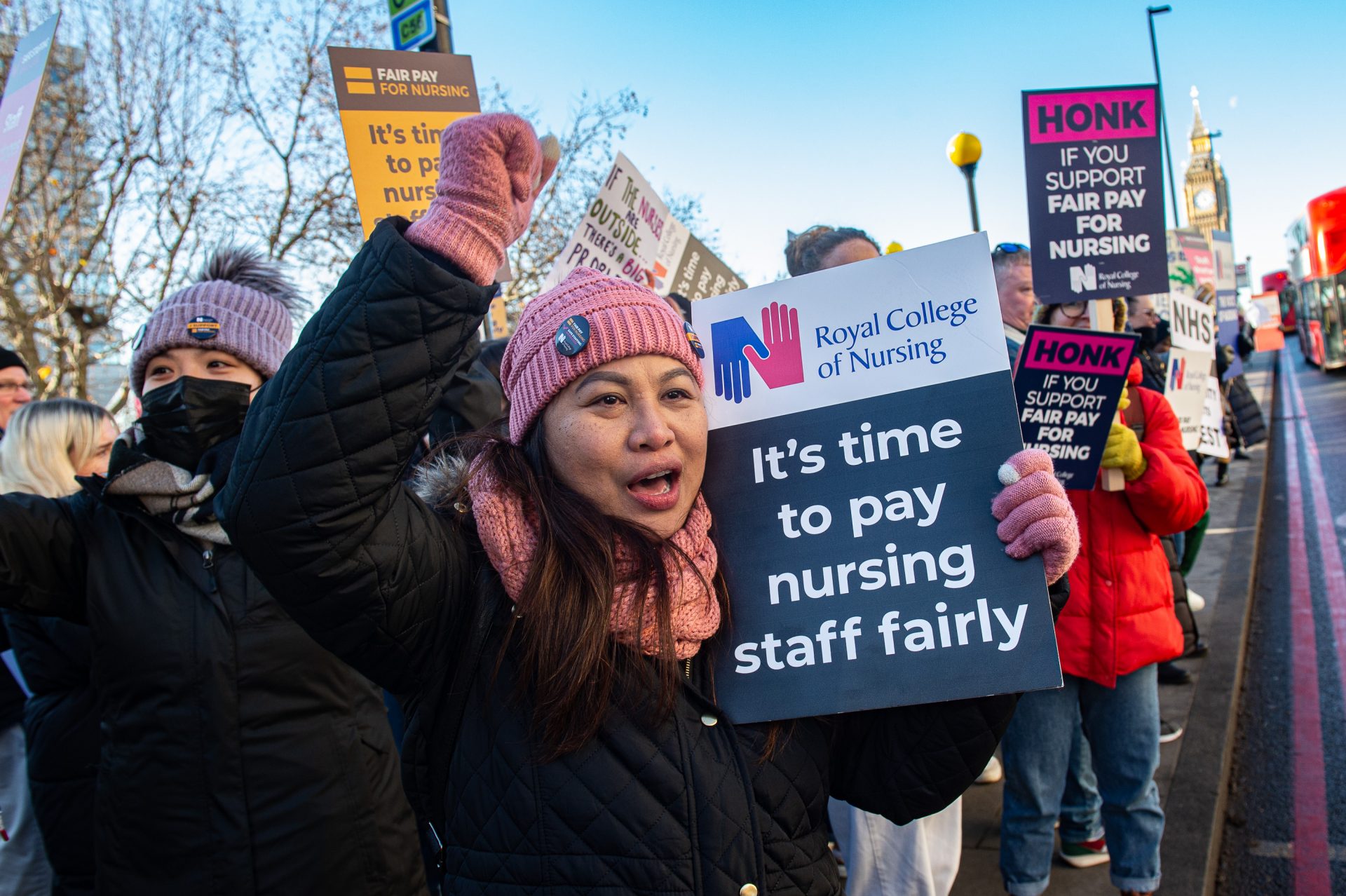Written by Katie Rosseinsky
Nurses, ambulance staff, postal workers and more will be walking out in the run-up to Christmas as part of ongoing disputes over working conditions and pay during the cost of living crisis.
This week will mark one of the most significant periods of industrial action in the UK in recent memory.
Ambulance staff, nurses, railway workers and Royal Mail employees are among the workers walking out over the next few days in protest over conditions and pay.
The government has said that around 1,200 members of the military and 1,000 civil servants will cover for striking ambulance and Border Force workers over the busy Christmas period, but unions say they are not “sufficiently trained” to take on ambulance roles, according to the BBC.
Here’s what you need to know about the upcoming strike action.
Nurses’ strike
Earlier this year, the Royal College of Nursing backed a strike across England, Wales and Northern Ireland for the first time in the organisation’s 108 year history. The first day of action fell on 15 December and the second will take place on Tuesday 20 December.
Staff in around a quarter of hospitals and community teams in England, all but one in Wales and all health boards in Northern Ireland will be taking part. Trade union laws mean that life-preserving care still has to go ahead during strikes, so nurses working in areas like intensive or emergency care will continue to work; instead, the action will impact routine services like health visits and planned operations.
GP services won’t be impacted, as nurses who work in practices did not take part in the ballot to strike.
The Royal College of Nursing is calling for a pay rise of 5% above inflation, and has said it will stage further strikes in January if the government does not negotiate with them on this. The NHS pay review body previously recommended that nurses receive around £1,400 more annually.
Ambulance strike
The three main ambulance unions – that’s Unison, GMB and Unite – are set to go on strike on Wednesday 21 December, with the action set to affect non-life-threatening calls only (category one calls, which deal with the most urgent incidents like cardiac arrest, will still be responded to, while some trusts have agreed exemptions for incidents placed within category two, such as strokes or serious chest pain).
10,000 ambulance workers – including paramedics, call handlers, emergency care assistants and other staff – across England and Wales are expected to walk out this week, while GMB members will do the same on 28 December.
They are striking over the 4% pay rise awarded by the government, which has been described by the GMB as “another massive real terms pay cut”.
Railways
As part of the ongoing dispute over rail workers’ pay, conditions and proposed job cuts, more rail strikes are set to take place over the Christmas break.
Members of the RMT union will walk out from 6pm on Christmas Eve until 6am on 27 December, as the union continues to negotiate with Network Rail, the company which manages Britain’s railway infrastructure.
The union said that the planned action should have minimal impact on travellers, as trains normally do not run on Christmas Day and Boxing Day, but Network Rail has claimed that it will mean that trains come to an early halt on 24 December.
Last week, RMT members voted to reject Network Rail’s most recent offer, which included a 5% and then 4% pay rise over a two-year period, as the union said it would involve “thousands of job losses, 50% cut in scheduled maintenances tasks and a 30% increase in unsocial hours”.
Royal Mail
After previously walking out on 1, 9, 11, 14 and 15 December, members of the Communication Workers Union are set to strike again on 23 December and 24 December, which could impact last-minute delivery in the run up to Christmas.
Royal Mail has warned that “services will be affected” by the strike, and has said it will not be able to deliver first and second-class letters (which will also not be collected from post boxes). It has, however, said it will endeavour to deliver as many Special Delivery and Tracked 24 items as possible, and will prioritise delivering Covid-19 tests and medical prescriptions. The majority of Post Offices will remain open.
The company said that it had offered the CWU “an enhanced pay deal of 9% over 18 months and a number of other concessions to terms and agreements”, but the union said that its most recent terms had been “thrown back in our face” and suggested that action could continue into the new year.
The union also objects to“widespread changes” to working conditions, including “introducing Uber-style owner-drivers, mail centre closures and changes to Sunday working”.
Border Force
It’s not just rail travel that could be impacted by strike action over the Christmas period: Border Force staff at Heathrow, Gatwick, Manchester, Birmingham, Cardiff and Glasgow are set to strike for eight days, between 23 December and 26 December, and then from 28 December to 31 December.
Workers at the port of Newhaven will also be walking out, which could affect ferry travellers.
The planned action will affect passport control desks, with more than 1,000 employees thought to be taking part, and the government has warned that travellers might face “serious disruption”. British Airways and Virgin Atlantic have reportedly already stopped selling new tickets for inbound Heathrow flights on the strike days.
A recent report in The Times suggested that plans are being drawn up to hold passengers on arriving flights to stop overcrowding in the arrival hall, with a source telling the paper that “delays of two hours at the border” were being discussed in meetings.
Members of the Public and Commercial Services union voted for strike action after they said the government had refused to increase an offer of a 2% pay rise.
Other strike action
Other members of the Public and Commercial Service Union (PCS), including driving examiners and some job centre workers, are striking in different areas across the country until early January. This week, there will be walkouts in the north west, Yorkshire and the Humber, where driving tests may be cancelled.
Traffic officers, also in the PCS, working in London and the south east are set to walk out from 22 to 25 December, though National Highways says no roads will be closed. And in south and west London, bus drivers in the Unite union who work for Abellio will be striking in a dispute over pay on 24 December.
Images: Getty
Source: Read Full Article





